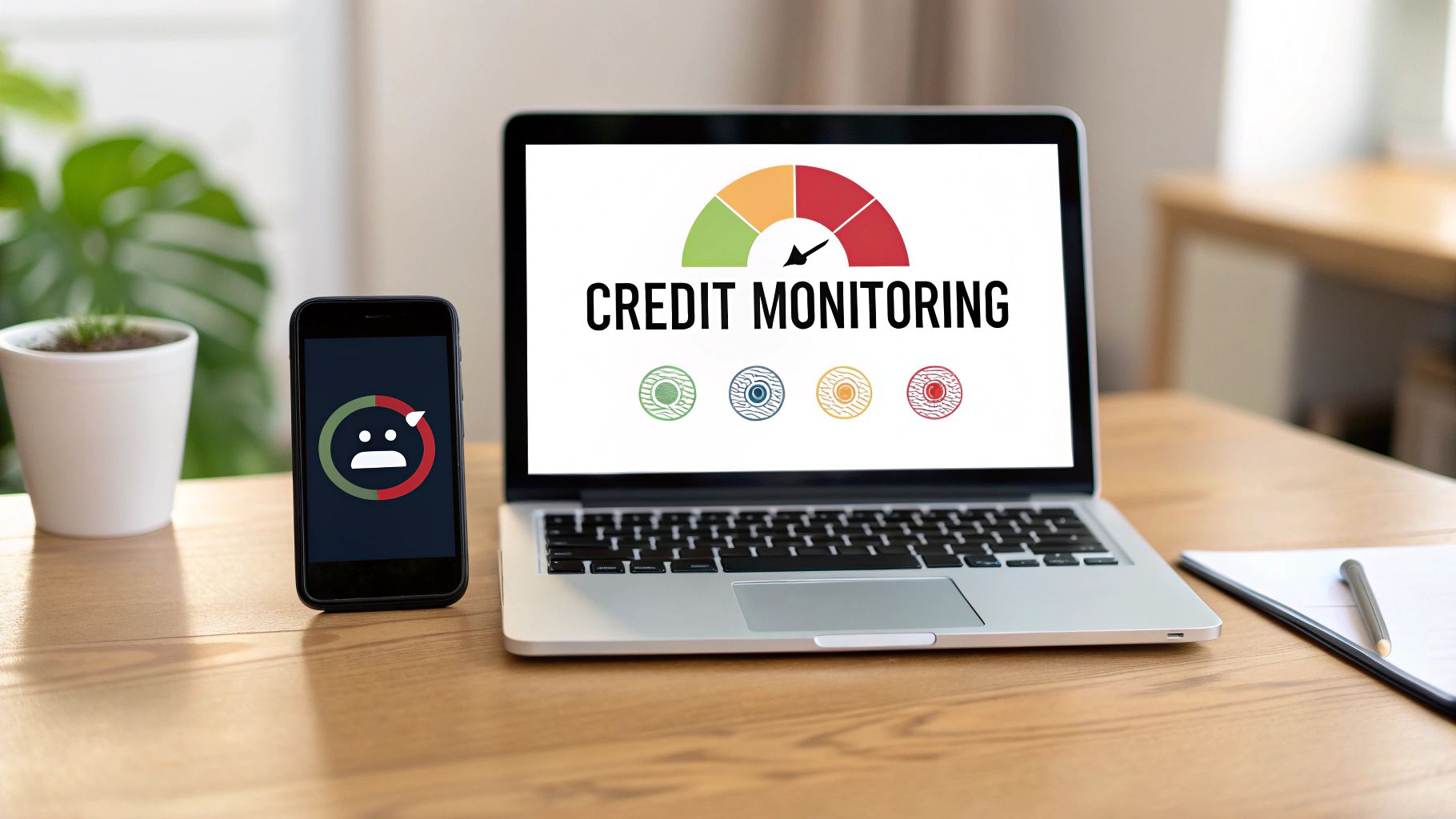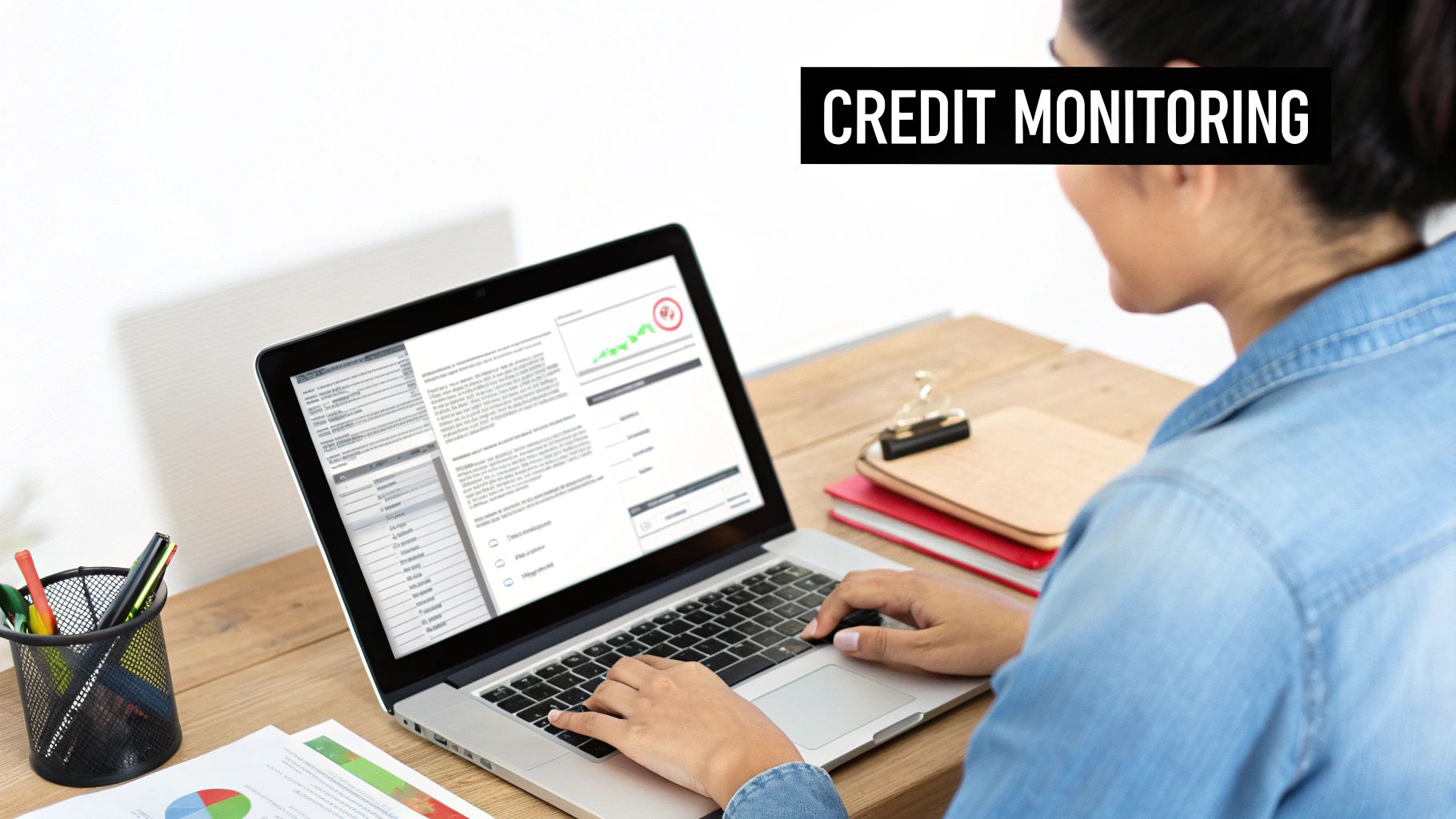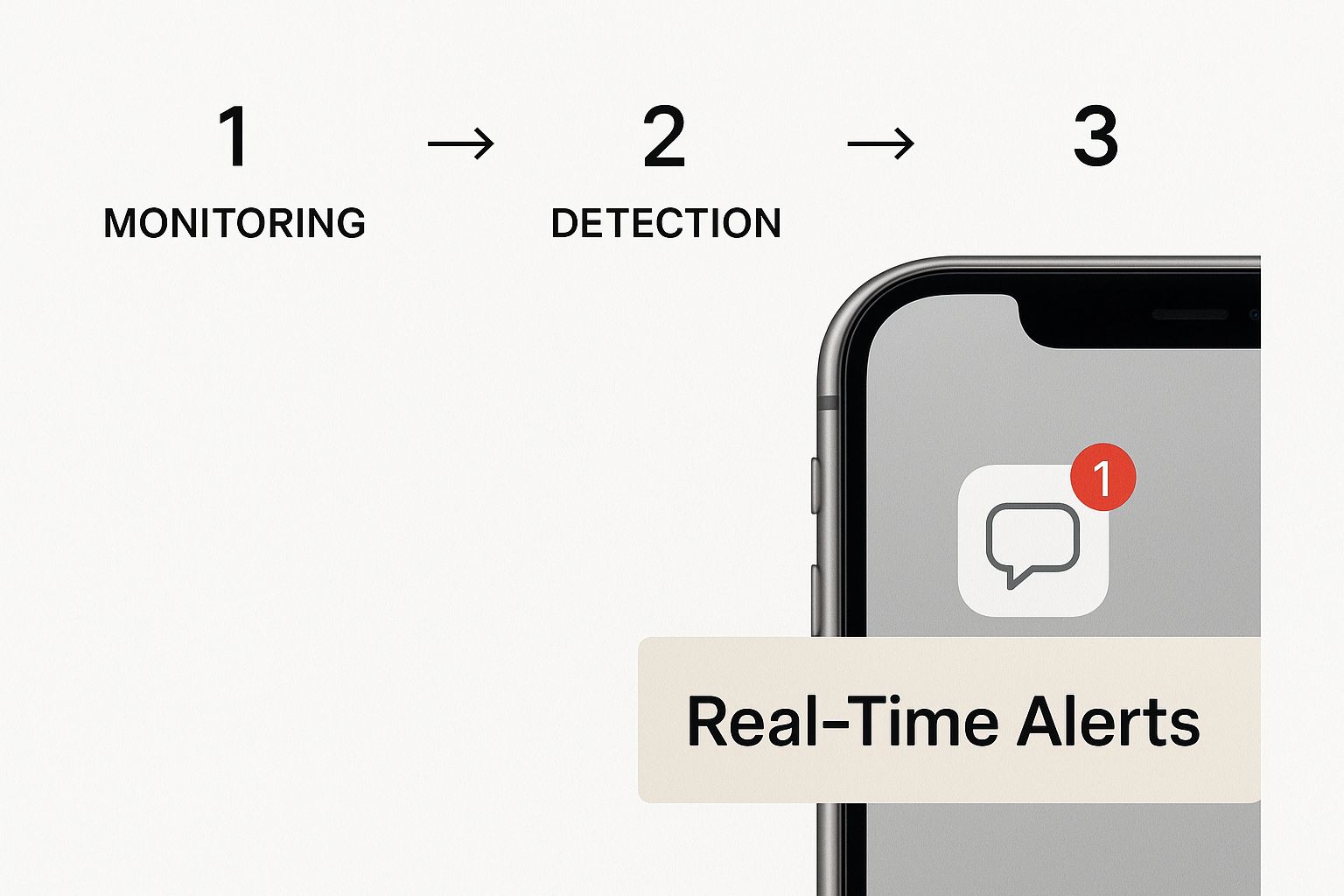What Is Credit Monitoring? Protect Your Finances Today

Think of credit monitoring as your personal financial security guard. It's a service that keeps a constant eye on your credit reports and immediately alerts you when something important changes. This acts as an early warning system, giving you a heads-up about potential fraud or identity theft before it snowballs into a major problem.
Understanding Your Financial Watchdog

Imagine a dedicated guard watching over your financial identity 24/7. While you're living your life, this service is tirelessly scanning your files at the three major credit bureaus—Experian, Equifax, and TransUnion. It's not just a one-and-done check; it’s a continuous surveillance system designed to catch red flags the moment they appear.
This constant vigilance is precisely why understanding what is credit monitoring is so crucial. In a world where data breaches are unfortunately common, your personal information is more vulnerable than ever. A good credit monitoring service is your first line of defense, putting the power back in your hands to react quickly.
The Financial Smoke Detector Analogy
Here's a simple way to think about it: your financial life is a house, and your credit report is the blueprint. In this scenario, a credit monitoring service is like having a smoke detector in every single room.
You hope you'll never actually need it, but just knowing it’s there brings incredible peace of mind. If a fire (fraud) starts smoldering in a back room (a criminal opens an account in your name), that detector sounds the alarm right away. This gives you the chance to put out the fire while it's small, long before it has a chance to cause catastrophic damage.
What Do These Services Actually Track?
The real power of credit monitoring comes from the specific changes it watches for. Once you're signed up, the service keeps tabs on key data points across your credit reports. You can expect to get an alert for things like:
To give you a clearer picture, here’s a quick breakdown of what these services typically cover and why each feature is so important.
Credit Monitoring at a Glance
This alert system shifts you from being a passive victim to an active defender of your own financial health. Instead of finding out about fraud months down the line from a debt collector, you can jump on it the moment it happens. That proactive capability is the single biggest benefit of using a credit monitoring platform.
How Credit Monitoring Services Actually Work
So, you understand the what, but how do these services really operate behind the scenes? It’s not magic. Credit monitoring services are essentially your digital watchdog, with a direct line to the heart of your financial identity: your credit files.
Think of it like a high-tech security system for your credit. This system is plugged directly into the three major credit bureaus—Experian, Equifax, and TransUnion—which are the official keepers of your credit history. The service uses sophisticated software to constantly scan for any new activity, from the smallest update to a major change.
This isn't a once-a-week check-in. The process is continuous, running 24/7 to catch things far faster than you ever could on your own. When something new pops up, like an application for a store card, the system instantly analyzes it to decide if it's something you need to know about right away.
From Data Point to Timely Alert
The real magic is in the speed. When it comes to stopping fraud, every second counts. Here’s a quick breakdown of how a small change on your report becomes an alert on your phone.
This is where the service truly proves its worth, turning raw data into a clear warning.

As you can see, the end result is simple: you get a heads-up that empowers you to act before a small problem becomes a huge headache.
The Role of Automated Systems
Let's be honest, no one has the time to watch their own credit files around the clock. That's where automated systems come in. These platforms are designed to spot subtle patterns that a person might easily overlook.
For example, a fraudster might start small by applying for a store credit card to see if your information works. If successful, they’ll aim higher with a big-ticket item like an auto loan. An automated system can connect those dots, flagging the sequence as suspicious and warning you at the very first step. This intelligent pattern recognition is what makes modern credit monitoring so powerful.
If you're curious about the different ways to keep an eye on your credit, our guide on how to monitor credit covers both DIY methods and the benefits of using a dedicated service.
Types of Alerts You Can Expect
Not all alerts are created equal. A good service will send you specific, useful information about the most critical changes to your credit profile.
You can generally expect to be notified about:
By tapping directly into the bureaus and leveraging smart automation, these services provide a vigilant, intelligent layer of protection. They turn complex data into simple, actionable alerts, giving you the peace of mind to manage your financial life with confidence.
Credit Monitoring Versus Checking Your Credit Report

A lot of people think credit monitoring is just a souped-up way of saying "check your credit report." While they're related, they couldn't be more different. Confusing the two is like mixing up a photograph with a live video feed—one captures a single moment in time, while the other shows you what’s happening as it unfolds.
Think of your credit report as that detailed photograph. It’s a historical document, a snapshot of your credit activity up to the exact moment you pull it. You’re looking back at your payment history, account balances, and past inquiries. It’s perfect for getting a deep, comprehensive look at where you've been financially.
Credit monitoring, on the other hand, is the live video feed. It’s an active, ongoing service that keeps an eye on your credit files for you. Instead of you having to remember to pull your report, the service is always watching and sends you alerts about new activity. This proactive approach is a total game-changer, especially for catching fraud before it gets out of hand.
Historical Snapshot Versus Real-Time Surveillance
Your credit report is fundamentally reactive. You pull it, you read it, and you see what's already happened. It's great for periodic financial check-ups, like reviewing your accounts once a quarter or before you apply for a big loan.
Credit monitoring flips the script and makes you proactive. It doesn't wait for you to log in. The second a hard inquiry hits your file or a new credit card is opened in your name, you get a notification. This turns your defense from a scheduled review into a constant surveillance system.
The two aren't competitors; they're designed to work together. Your credit report provides the detailed history you need for analysis, while monitoring offers the real-time alerts required to protect that history. It’s a big business for a reason—the global credit reporting market, which is closely tied to monitoring services, is projected to hit $28.47 billion by 2032. With North America holding a 43% market share, it's clear how integrated these systems are in our financial lives. You can read more about these market trends over at FactMr.com.
Credit Report vs. Credit Monitoring: A Direct Comparison
To really nail down the distinction, let's put them side-by-side. Seeing how they differ in their purpose, frequency, and core function makes it obvious why you need both for a truly solid financial strategy.
Ultimately, just pulling your credit report once a year is like having a security camera that you only check on your birthday. Sure, you'll eventually see if someone broke in, but by then, the damage is long done. Credit monitoring is having that same camera hooked up to a live alert system that pings your phone the second it detects motion, letting you react before a thief can even get through the door.
The Real-World Benefits of Credit Monitoring
It’s one thing to understand the mechanics of credit monitoring, but it’s another to see the real-world difference it makes. This isn't just about data points on a screen; it's about gaining tangible, powerful advantages that protect your finances and help you make smarter decisions. It’s the difference between reacting to a problem and getting ahead of it.
The most immediate benefit? Catching fraud the moment it happens.
Imagine you get a text alert: someone just tried to open a credit card in your name, in a city you've never even been to. That single notification is the line between a small headache and a months-long nightmare trying to clean up your finances.
This kind of early warning system lets you shut down fraud before the damage is done. Instead of finding a maxed-out credit card statement in your mailbox weeks later, you can call the lender and credit bureaus immediately, stopping the fraudulent account in its tracks.
Preventing Identity Theft From Spiraling Out of Control
Identity theft is rarely a one-and-done event. It usually starts small. A thief might open a simple store credit card to see if your information works. If they succeed, they get bolder—applying for bigger loans, changing your address, and weaving a complicated web of fraud that can take years to unravel.
Credit monitoring acts as a circuit breaker. It alerts you to that very first suspicious move, stopping criminals before they can escalate their attack. This containment is absolutely critical. Unchecked identity theft can wreak havoc on your life, affecting your ability to get a mortgage, a car loan, or even pass a background check for a job.
The market for these services tells the story. Valued at around 7.5 billion** in 2024, it's expected to jump to **12 billion by 2033. This isn't just a trend; it's a clear signal that people are looking for this layer of protection against increasingly sophisticated fraud. You can dig deeper into these numbers at Verified Market Reports.
Gaining Control Over Your Credit Score
Beyond just playing defense, credit monitoring is a fantastic tool for taking control of your financial life. It gives you a direct, real-time window into how your habits shape your credit score. Many services even include score simulators, which help demystify the numbers and show you what actually moves the needle.
For example, you can see exactly how paying down a credit card balance lowers your credit utilization and gives your score a boost. This immediate feedback turns abstract financial advice into concrete results you can actually see.
This kind of insight is invaluable. It’s like learning the rules of the game so you can finally start winning. By actively managing these details, you put yourself in a position to qualify for better interest rates on loans, which can save you thousands of dollars over the years. For more tips, check out our guide on how to maintain good credit.
Ultimately, all these benefits lead to one crucial thing: peace of mind. Knowing you have a guardian watching over your financial identity lets you focus on your goals without constantly looking over your shoulder. You’re prepared, protected, and in control.
How to Choose the Right Credit Monitoring Service
With so many credit monitoring services out there, picking one can feel a bit like spinning a roulette wheel. But it doesn't have to be. The real goal is to find a service that gives you solid protection without a bunch of bells and whistles you'll never use. You're looking for that sweet spot: powerful security, an easy-to-use interface, and a price that makes sense for you.
Think of it this way: certain features are non-negotiable. They're the foundation of your financial security. Everything else is an add-on that might be nice to have, depending on how much risk you're comfortable with and what keeps you up at night.
Ultimately, this is about matching a service's features to your life. If you have a long credit history with multiple loans and credit cards, you'll probably want a more comprehensive plan. If you're just starting to build credit with your ITIN, a more basic service might be all you need. Let's dig into what really counts.
Core Features You Should Always Look For
When you're comparing services, some features are absolute must-haves. Without them, you're only getting a piece of the story, leaving you with some serious blind spots.
First and foremost, insist on three-bureau monitoring. This is probably the single most important feature. Why? Because lenders don't have to report to all three major credit bureaus—Experian, Equifax, and TransUnion. A fraudster could open an account in your name that only shows up on your Equifax report, and you might not see it on your TransUnion file for months.
Next up, you need a solid set of identity theft protection tools. The best services usually bundle these in:
These core elements create a powerful safety net, protecting you from both credit-specific issues and broader identity fraud.
Free Versus Paid Services What Is the Trade-Off
The choice between a free and a paid service really boils down to how much coverage you want. Free services are fantastic for keeping an eye on your credit score and getting basic alerts from one or maybe two of the bureaus. They're a massive step up from flying blind.
Paid services, on the other hand, are where you find the more advanced features we just covered. They're the ones that almost always offer comprehensive three-bureau monitoring, identity theft insurance, and that all-important restoration support. That monthly fee is what you pay for a higher level of security and, frankly, peace of mind.
To help you sort through the options, our detailed credit monitoring services comparison breaks down what the top providers offer, so you can easily see what you get for your money.
Questions to Ask Yourself Before Deciding
Before you pull the trigger, take a minute to think about your own situation. Answering these questions honestly will guide you to the right service for your needs.